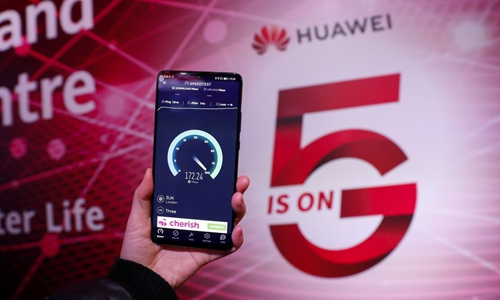HOME >> SOURCE
Huawei unveils ecosystem plan, prepares for potential US ban
Source:Globaltimes.cn Published: 2020/2/25 1:18:37 Last Updated: 2020/2/25 5:30:56

A staff member tests the speed with a Huawei 5G mobile phone at Huawei 5G Innovation and Experience Center in London, Britain, on Jan. 28, 2020. (Xinhua/Han Yan)
Huawei unveiled its latest products including the 5G foldable phone Mate Xs in Barcelona on Monday, featuring its self-developed 5G Kirin 990 chipset, amid the growing novel coronavirus (COVID-19) outbreak and a potential US crackdown.
In preparation for its return to the European smartphone market, the company plans to build an HMS ecosystem. The design will include the new HMS Core 4.0 as a potential US ban looms, which would prevent it from using Google services.
The Chinese tech giant vowed to invest a total of $1 billion and host over 100 events to attract global developers to participate in its HMS ecosystem.
The event comes as Huawei had recently secured a green light for the construction of a 5G rollout in Germany and the UK, which was seen as a major victory across the continent amid intensified US pressure. Huawei also launched a 5G program in London last week, indicating the company's market ambition.
The company has also experienced an exceptional performance list over the past year, as it expects revenue of 850 billion yuan ($120.84 billion) for 2019, a year-on-year growth of 18 percent,Richard Yu Chengdong, CEO of Huawei Consumer Business Group,said at the event.
Despite lagging overseas sales by the threat of a US ban, global shipments achieved a growth of 16.8 percent year-on-year for 2019, reaching a total of 240 million. Shipment of its 5G handsets surpassed 10 million as of January 2020, Yu said.
Investors have also bet big on the firm as relevant shares of Huawei and its chip subsidiary Hsilicon jumped on Monday, opening on the expectation of the new product launches.
Analysts cautioned that this year would not be easy for Huawei in Europe, especially if a US ban is implemented. The potential US move would prohibit the company from using Google-related services like Gmail and YouTube, which are considered essential among Europeans. This may discourage many Europeans from purchasing Huawei handsets.
The threat of a US ban hindered overseas sales last year and comes at a time when the company was on course to surpass Samsung as the world's top smartphone vendor.
"The firm is trying to win back the overseas phone market through developing its HarmonyOS and HMS ecosystem, in preparation for a US supply cut, and support its overseas sales," Jiang Junmu, chief writer at Chinese telecom industry news website c114.com.cn, told the Global Times on Monday.
According to Huawei's previous operating results for the first three quarters of 2019, HMS ecology developed rapidly, covering more than 170 countries and regions worldwide, with over 1.07 million global registered developers.
While the picture remains unclear, said an industry insider, and close Huawei follower, especially when the HarmonyOS is still premature, and COVID-19 is partly disrupting its supply chain and causing shipment delays.
The firm faces a more critical problem as the US considers banning Huawei from using global chip suppliers, including TSMC, the world's largest contract chipmaker.
"It will have to prepare for another more challenging plan B if it's cut from the TSMC," the insider said.
Posted in: COMPANIES